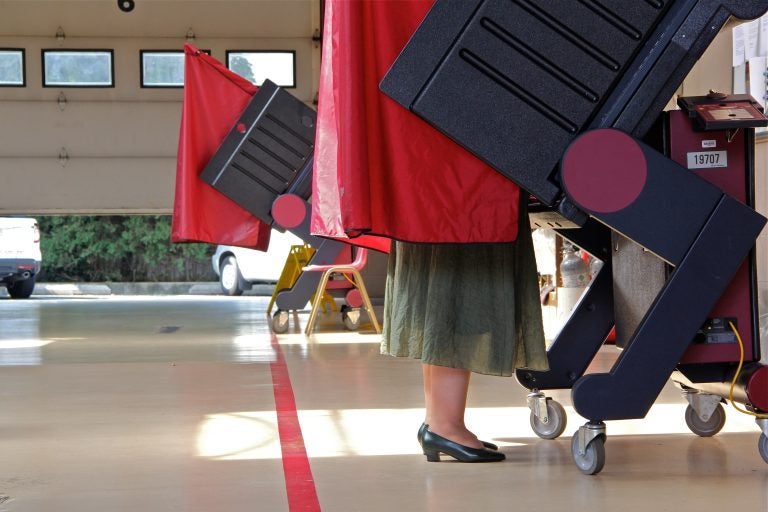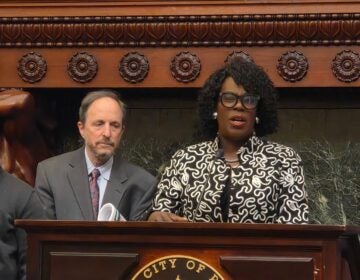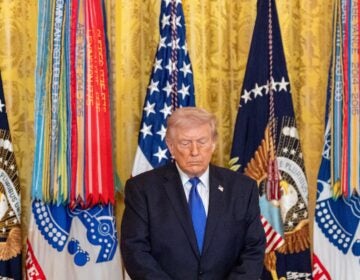Election security: The dire issue the Democrats barely mentioned
How did 20 Democrats vying to appear on the 2020 ballot debate last week without ever assailing the Republicans' refusal to protect that ballot from Russian interference?

File photo: A voter casts their ballot on Election Day. (Emma Lee/WHYY)
How was it possible that 20 Democrats, vying to appear on the 2020 ballot, debated last week for four hours without ever assailing the Republicans’ steadfast refusal to protect the 2020 ballot from Russian interference? Didn’t that dire issue warrant at least a few substantive minutes?
Mitch McConnell, the GOP Senate leader who’s seemingly determined to do Vladimir Putin’s bidding, continues to block all Democratic reform efforts — including a requirement that all states use backup paper ballots to thwart a cyber-invasion (New Jersey and Delaware don’t have them, nor do most Pennsylvania jurisdictions — although all three states are moving towards buying new voting machines). Candidate Amy Klobuchar, a paper-ballot reformer, zinged McConnell in a random sentence, entrepreneur Andrew Yang said the Russians “have been hacking our democracy successfully and they’ve been laughing their asses off,” and Bill de Blasio said, “we need to stop them” — but you’d have to scour the transcripts with a magnifying glass to find much more. Elizabeth Warren unveiled an election security plan early last week, but, during the debate, she never mentioned it.
We’ve reached the point where one political party refuses to safeguard democracy, and the other party seems powerless to do anything about it — or even to talk substantively about it when given a national platform. Meanwhile, the guy who was Moscow’s favored candidate in 2016 (according to Robert Mueller and the U.S. intelligence consensus) still won’t acknowledge Moscow’s past role, much less voice any consternation about the threat of more in 2020. Indeed, over the weekend, he caved yet again to Putin, this time at the G-20 summit, on the issue of Russian election interference: “You know he denies it totally … I mean, how many times can you get somebody to deny something? But he has, in the past, denied it. He’s denied it also publicly.” And besides, Putin “is a great guy … He is a terrific person.”
Trump’s Senate minions are suppressing reform bills that would, among other things, require those paper ballots; require post-election vote audits in places where the results look fishy; require that political campaigns report to the FBI any offers of help from foreign powers; establish new federal security standards for vendors who make and operate voting machines; make it a federal crime for anyone to hack into a local election system; and require social media platforms, like Facebook, to disclose the purchasers of political ads. Makes sense, right? As the vice president of the nonpartisan National Election Defense Coalition told the press early last week, the burgeoning electoral threat “is a national security crisis — nothing less — and it requires a federal response.”
Why the Democratic debaters failed to highlight this threat — and distinguish the party that seeks to defend democracy from the party that continues to undermine it — was frankly baffling. Perhaps they fear that standing up for the credibility of the ballot would be roundly dismissed as a partisan ploy. But have we truly fallen so far as a nation that election security is no longer an all-American nonpartisan value?
Fortunately, our top intelligence people still believe it is. The Democratic candidates can find plenty of nonpartisan cover, if they care to look for it.
Admiral Michael Rogers, while serving last year as chief of the National Security Agency, warned in congressional testimony that “we’re probably not doing enough” to stop the Russians from interfering with future American elections. They “haven’t paid a price at least that’s sufficient to get them to change their behavior … We have not opted to engage (with) some of the behaviors we are seeing. If we don’t change the dynamic, that (behavior) is going to continue, and 2016 won’t be viewed as isolated.”
In late April, FBI director Christopher Wray, citing the presence of Russian military intelligence officers on American soil, told the Council on Foreign Relations that “our adversaries are going to keep adapting and upping their game. We we are very much viewing 2018 as just kind of a dress rehearsal for the big show in 2020.”
Early last month, Robert Anderson, a former FBI official who specialized in espionage, warned in congressional testimony that the Russians “will absolutely exploit any avenue they can. They’re some of the best in the world, quite frankly. Russia likes to sew the web broad and wide … They’re not leaving. I can guarantee you they are still here looking at the next presidential election and figuring out how they can attack it through (human intelligence), cyber, or any way they can.”
And now there’s a new report, authored by intelligence experts for the U.S. Joint Chiefs of Staff, which spotlights the ongoing Russian threat — and our need to combat it. The report that says that Russia’s goal is to supplant America’s global influence, via the mastery of “hybrid warfare” — specifically, “the use of paramilitary forces and other proxies, interference in political processes, economic and energy exploitation, espionage, and media and propaganda manipulation.” (My italics.)
Unfortunately, America as we know it today seems incapable of thwarting the threat. Anna Borshchevskaya, a senior fellow at the Washington Institute for Near East Policy, and one of the report’s authors, says: “We still have a story to tell, but because we are so polarized and are doubting ourselves, we have a narrative problem.”
You bet we do. The political party that once touted strength against Russia has become complicit. It falls to the Democrats to stand up for America, and use their debates to frame the narrative.
WHYY is your source for fact-based, in-depth journalism and information. As a nonprofit organization, we rely on financial support from readers like you. Please give today.




